Chapter 82
“Then it sounds like he’s going to be fine,” William said. He leaned back in his chair, propping his feet on the matching ottoman.
Charles, who sat on the edge of his chair, nodded. “I never thought they’d have him up and walking so soon.”
“And it’s encouraging that they moved him out of the CCU.”
“Considering all of that, he sure was in a foul mood today.”

After half an hour of awkward conversation with Mrs. Bingley and Louisa out on the terrace—mercifully, Caroline was at company headquarters, working—William and Charles had settled into the walnut-paneled library. It was an unmistakably masculine retreat with its soft leather chairs, a well-stocked bar in the corner, and the acrid perfume of pipe tobacco hanging in the air. A fire popped and crackled in the fireplace, contributing ambience but little light or warmth.
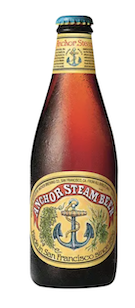
Charles nearly choked on a mouthful of Anchor Steam, his beloved San Francisco beer “Are you kidding? Like I said on the phone, his health is just the beginning.”
“Then let’s hear the rest.” William swirled the cognac in his glass, inhaling its aroma with appreciation. Whatever Mr. Bingley’s other failings might be, he knew good cognac.
Charles set his beer bottle on the end table, knocking a silver ashtray onto the floor. He leaned over to retrieve it and dropped it on the table with a clatter. “We knew he hadn’t been feeling well lately. But he never told us it was angina, getting progressively worse. The doctor had told Father he needed bypass surgery, but he refused. As far as he’s concerned, he’s too busy to be sick.” He raised his eyebrows, directing a crooked grin at William. “Remind you of anyone?”
Elizabeth had cured William of disregarding his health. At the thought of her, a wave of pain washed over him, but he gripped his glass tightly and maintained a neutral expression while Charles continued his story.
“Anyway, after his heart attack Thursday night the doctors said the surgery couldn’t be delayed any longer. Father told me he’d been putting it off because if he died there was no one he trusted to take his place at the helm of the company.”
“I thought bypass surgery had a high success rate.”
“Even the smallest risk is unacceptable to Father when it comes to medical decisions. But I guess Thursday night he came face to face with his mortality.”
“What happened?”
“He told me I’d had my ‘fun,’ as he called it, and it was time to move into the executive suite and start learning how to run the company.” Charles paused to take another gulp from his beer bottle. “He’s a smart man. Why can’t he accept that I’m not executive material?”
“You’re his son, and clearly that means something to him.” William sighed. This wasn’t a good time to draw parallels to his own family history.
“But Caroline is the one who’s qualified for the job. How long do you think it would take me to run the company into the ground? Five years, maybe? Unless I’d already blown my brains out by then.”
“Charles, If you feel that strongly about it ….” William stopped himself from continuing. Charles’s alarming comment demanded some response, but William was in enough trouble already for offering unsolicited advice. Instead, he would encourage Charles to keep talking, not that he seemed to need much encouragement. “What did you tell him?”
“The nurse came in and shooed me away before I had a chance to say anything.”
“Has the subject come up since?”
Charles’s foot, resting on his opposite knee, began to waggle in a fast-paced dance. “Yeah, though I managed to avoid it till today. CCU patients are allowed only limited visitation. I used that as an excuse to hang out in the lounge and let the others see him.”
“But now that he’s on an ordinary ward, the restrictions are gone.”
“You got it. Today he asked to see me alone. He had a bunch of things for me to do—meetings to attend in his place, calls to make, stuff like that.”
“So the wheels are turning.”
“And I can’t seem to stop them. I don’t even know if I should.” Charles lifted a small glass paperweight from the table beside him and began to roll it in his hand. “I’ve been arguing with myself nonstop, and I thought I’d decided to accept my fate. After all, how can I say ‘no’ to a critically ill man? And is it so much to ask, for him to know his legacy will be cared for?”
Before William could devise an appropriate response, Charles went on. “In spite of that, I almost told him to take his job and … well, you know. It was like somebody else had taken over my body. I was standing there sweating and shivering both at once.”
William stared at Charles. “You ‘almost’ told him? What did you say?”
“Nothing. I just left the room.” Charles took a long pull from his beer bottle. “Do you remember when he was so sick during my sophomore year at Juilliard? I missed spring break at Pemberley with you and Richard because Mom asked me to fly home. That was when Father told me I had to leave Juilliard, and that he’d enrolled me in the business school at USC starting in the fall. I can’t seem to stop thinking about that day.”
Charles hauled himself to his feet and strode across the room. He retrieved another beer from a small refrigerator and leaned against the bar. The harsh beam of the track lighting shone on one side of his face, leaving the other side in shadows. “I’ll always remember that hospital room—the nondescript beige walls, the diamond pattern in the floor tiles, the antiseptic smell coming from the bathroom. When he told me I had to drop out of Juilliard, it was like he had reached into my gut and yanked out a piece of me. I was … less, somehow, after that.”
“I understand. I know what it feels like to be told to give up music as a career.”
“But you didn’t let it happen. That’s the difference between us. You seem to find a way to achieve your goals no matter what. I’ve always admired that about you.”
“That’s not fair. When my father tried to stop my music education, Mamma and Gran protected me. You didn’t have anyone doing that for you.”
“How old were you then?” Charles asked, folding his arms over his chest.
William shrugged. “Eight or nine, the first time it happened. But he didn't give up till I was about fourteen and already performing.”
“Yeah. You were just a kid; I’m a grown man. But that’s me. I just drift along. People like you and my father make things happen; people like me have things happen to them.”
“It’s not a crime to want to please your parents.”
“I’ve been telling myself that for years. But isn’t it maybe a crime to let yourself disappear in the process?” Charles’s voice, though quiet, held a note of desperation.
William had no answer for that. He stared at the amber liquid in his glass.
A log split in two in the fireplace, and the flames leapt momentarily to life. Charles prodded the embers energetically with a poker. “This afternoon when Father started barking orders, all of a sudden I was twenty again and back in that other hospital room, inspecting those diamond-patterned floor tiles so I didn’t have to look him in the eye while he took my future away from me. And I’ve been wondering why I didn’t fight him harder back then.”
“Maybe you knew from experience that you’d lose.”
“Maybe, but I have to take some of the responsibility, don’t I?” Charles flung himself into his chair, hunching forward, chin supported by his fist. “I gave up my dream of being a professional musician because he said I had to. I studied what he told me to study. I took the jobs he told me to take, and then he micro-managed me until he might as well have been doing the jobs himself. And the truth is, I let him do it. It ensured me a comfortable life, with plenty of time for surfing and training for 10K races and hanging out at jazz clubs.”
“I’m sure it was more than just that. Your father is a difficult man. Anyone would have trouble standing up to him.”
Charles nodded. “And I can talk tough here, when it’s just us. But tomorrow morning I’m going to take one look at that sick old man in his hospital bed and agree to whatever he asks. And we haven’t even talked about the effect on Mom. I’m much more aware now than I ever was before of what a hard life she has, dealing with him. If I defied him and went off on my own, she’d be alone, with nobody to protect her.”
William sighed. “You’re in a difficult position.”
“Tell me something I don’t already know.”
They fell silent. William settled back in his chair, his eyelids drooping as he gazed at the faint glow in the hearth. He needed to talk to Charles about Jane, but after two consecutive sleepless nights, he was too tired to compose his thoughts. There would be time tomorrow. He stifled a yawn behind his hand.
Charles must have noticed, because he smiled and said, “I’m sorry, Will. I didn’t mean to talk your ear off.”
“You didn’t. I just haven’t slept much lately.”
Charles raised his eyebrows, wearing a hint of a leer. “Sounds like you and Lizzy have been enjoying yourselves.”
William’s heart contracted, his only answer a weak smile.
“Come on, let’s get some sleep,” Charles said, rising to his feet. “I was thinking we could get up early tomorrow and go to the beach—maybe go for a run, and I can catch a wave or two before we head to the hospital. There’s a storm in the Pacific that’s supposed to be generating some decent swells.”
“That sounds good.” William stood up. “You know, I’m getting my strength back. I bet I can beat you in a sprint.”
“I’ve got fifty bucks that says you can’t.”
“Done.”
Charles chuckled and clapped William on the back. “I’m glad you’re here, Will. And by the way, thank Lizzy for me. I know it was tough for her to let you go two days early. She’s quite a girl.”
William attempted a smile as they left the library. “Yes, she is.”

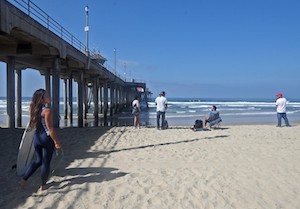
Huntington Beach, immortalized by Jan & Dean as “Surf City” in their 1960s song, was sparsely occupied on this November morning. A few runners and walkers moved along the water’s edge, and a group of surfers—Charles among them—bobbed about in the ocean like oversized seabirds, awaiting a wave worthy of their skill. William zipped up his jacket and shoved his hands in his pockets as the offshore breeze began to rise. Despite his current discomfort, the chill had its advantages. Combined with an energetic run along the beach, the bracing temperatures had cleared the worst of the fog from his brain, leaving behind only a few remnants of his third nearly sleepless night.
He had occasionally dozed, but his brief naps had been a mixed blessing, bringing with them two disturbing dreams. In the first, Elizabeth taunted him with his failings, her eyes icy with contempt as she ordered him from her home … and her life. He awoke to find his mood dark, his eyes full of tears.
His other dream was in its own way just as disturbing. Instead of rejecting him, this time she had played the consummate seductress, seeking out every sensitive spot on his body and besieging him with merciless pleasure. He awoke from this dream drenched in sweat, his heart pounding out a frantic rhythm. Sleep had eluded him after that. He had welcomed Charles’s quiet knock on his door not long after dawn, renewing the suggestion of an early-morning trip to the beach.
William was astonished by the speed at which his life had become such a nightmare. Friday morning he had boarded a plane, anticipating the moment when he would slip a diamond ring onto the finger of the most wonderful woman in the world. Only three days later he was alone and despondent, the ring stashed in the San Francisco penthouse, where it would remain until he could bear to dispose of it somehow.
He tried to convince himself that he was being too pessimistic, that there was still a chance he could win her forgiveness. But he couldn’t believe it, despite Jane’s tentative encouragement the previous afternoon. Elizabeth, for all her virtues, was stubborn and quick to judge others. Without his persuasive influence, her opinions would calcify and their temporary estrangement would become permanent.
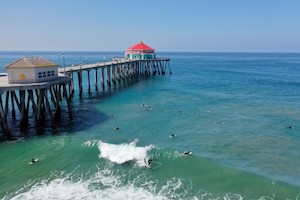
Last night, Charles had said that William was a person who made things happen. But how could he do that with Elizabeth? She would judge him harshly if he failed to keep his promise to stay away. Gifts wouldn’t work either; she would scoff at them as examples of his tendency to throw money at problems. Yet what was the point of having money if you couldn’t use it to make the people you loved happy?
Three small shorebirds toddled past in search of breakfast. William’s melancholy expression softened as they skittered away from the rising water, and then abruptly veered toward it, and away from him, when he startled them by stretching his legs.
The roar of the ocean seemed to grow louder, punctuated by distant shouts. William glanced up to see that Charles and two of his comrades had caught by far the largest wave of the morning. Looking every inch the quintessential California surfer, Charles skimmed across the curling wall of water, moving in tandem with the wave in a powerful yet graceful pas de deux. When the wave disintegrated into chaos near the shore, he dropped off his board and trotted out of the surf, his eyes flashing.
“Well done,” William said.
Charles’s grin grew wider. He set down his board and reached for his towel. “I wish we could stay for a few more hours, but I’d like to get to the hospital by eleven at the latest.”
William rose to his feet, grabbing his running shoes. “Then let’s go.”
“We still have time for breakfast, though; I’m starving. I thought we’d go to the diner up on the pier—more fun than eating at home. I just need to change out of my wetsuit.”
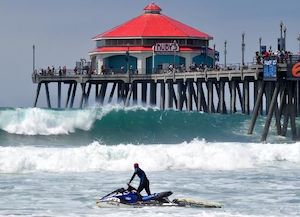
Finding himself unusually famished, he added scrambled eggs to his usual spartan breakfast, and when the food arrived he ate with gusto. Charles ate heartily as well, sharing stories of his teenaged hijinks at the beach between bites of his huevos rancheros.
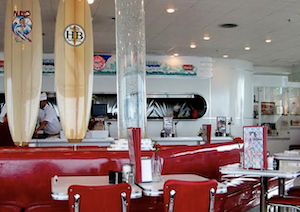
“Pretty much. We hung out down here even when the waves weren’t any good. So did our girlfriends; a few of them surfed too, and the rest would sunbathe and gossip while we were out on the water. In fact, I lost my virginity on the beach, not far from the pier.”
“I assume there’s a commemorative plaque on the spot.” William’s sarcasm masked envy; compared to his teen years, Charles had drifted through a golden stream of carefree days.
Charles laughed. “There should be, considering the price I paid. I was a junior and she was a senior, a friend of Caroline’s. I’d been drooling over her for months, so when she started coming on to me at a beach party one night I didn’t ask any questions. Afterwards I found out it had been a ploy to make her boyfriend jealous. He wanted to play the field, so she decided to give him a helping of sauce for the gander.”
“Did it work?”
“Yes, unfortunately for me. He was an All-State fullback, and he beat me bloody when he heard about it. Come to think of it, that happened on the beach, too.”
“I suppose you learned the error of your ways after that and turned to a life of celibacy.”
“Yeah, right.” Charles rolled his eyes. “From then on I just made sure the girl didn’t have a jealous boyfriend, especially not one who outweighed me by fifty pounds.”
William chuckled. “A wise choice.”
“How old were you, your first time?” Charles asked, spearing a mouthful of eggs.
“It happened on my sixteenth birthday.”
“Where?”
“In a suite at the Plaza.”
“It figures,” Charles retorted, his mouth twisting in a crooked grin. “You feasted on champagne and caviar. I got my ass whupped.”
“I can’t take the credit. The evening was my birthday present from Richard.”
Charles’s eyes shot open. “He got you a hooker for your birthday?”
“No. He called two girls he’d met the summer before and invited them to join us for dinner. A private dinner in our two-bedroom suite.”
Charles’s fork clattered onto his plate. “Nice birthday party.”
William couldn’t help but enjoy Charles’s astonishment. “Richard always treated me like a peer, not like his kid cousin. He protected me when I needed it, but he never patronized me.”
“And he decided it was time to expand your education. Did he tell her, ‘I give you the boy. Give me back the man’?”
“He may have,” William answered, chuckling. “No, seriously, I don’t think Richard told her anything except that I was his cousin and a student at Juilliard.”
“Did anybody tell her that she was initiating a novice?”
“She saw how nervous I was and guessed. I was terrified. Among other things, I wasn’t sure if my heart was strong enough. I kept imagining Gran getting a call telling her that I’d expired in flagrante delicto.”
Charles’s whoop of laughter turned into a cough when he nearly inhaled his coffee. “Sorry,” he sputtered, gasping for air. “I don’t mean to make fun of—” His words dissolved into a coughing fit.
“Are you okay?”
Charles nodded, still coughing, his face a bright pink. When he was able to speak again, he grinned. “I guess that’s what I get for laughing at you.”
“Serves you right,” William replied, smiling. “It wasn’t the least bit amusing at the time. But I admit, in retrospect it’s funny.”
“I guess I’ve learned my lesson about swapping high school stories with you.”
William took a deep breath. It was as good a time as any, when Charles was relaxed and happy, to bring up Jane and the prenup. “Charles, there’s something—”
“Sorry to interrupt, Will,” Charles said, looking at his watch, “but I didn't realize it was so late. We've gotta get to the hospital. Whatever it is, can it wait till later?” His manner had completely changed; he sat fidgeting with his car keys, his expression tense.
William nodded his assent, silently chiding himself for feeling relieved at the delay. He knew that he had to raise the subject—he owed it to both Charles and Jane—but it wasn’t going to be easy.
“And you’re buying breakfast, right, with your ill-gotten fifty bucks from our bet?”
“Ill-gotten? Hardly.” William signaled for their check. “You’re just a sore loser.”

